International
Argentina Pride march hails progress, calls for more rights laws
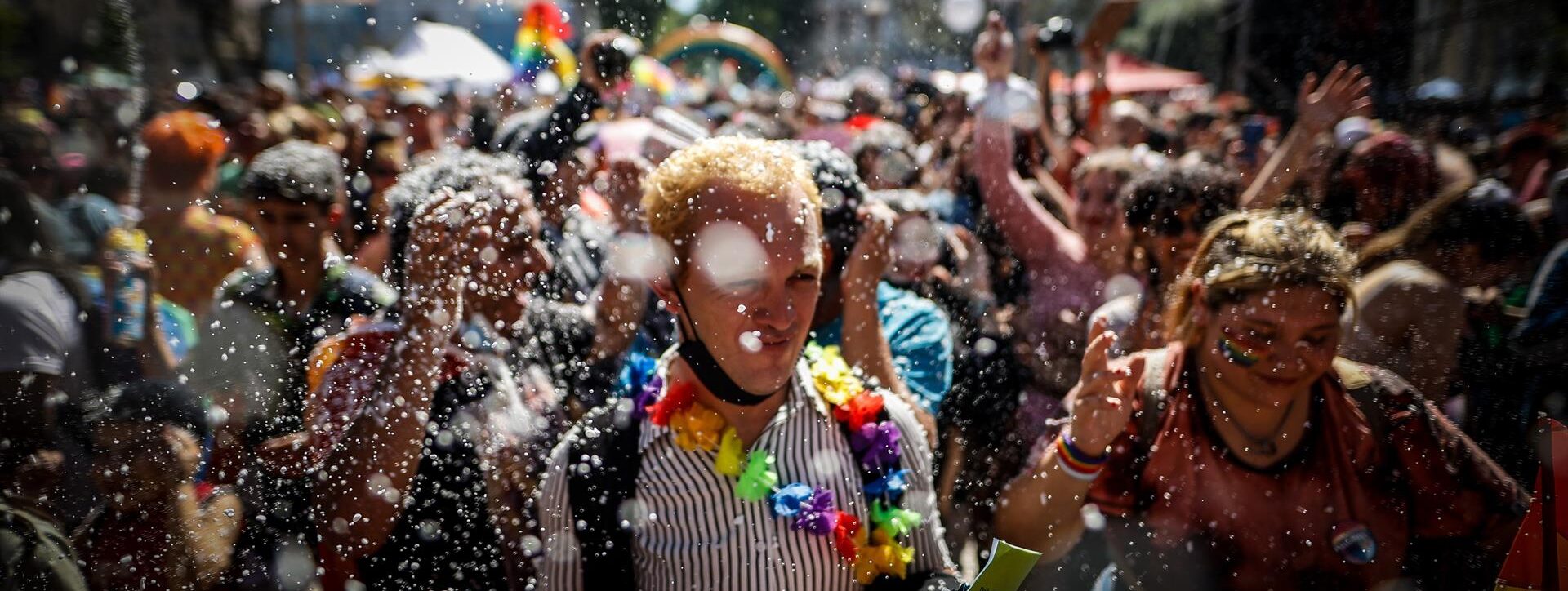
AFP
Thousands of people on Saturday celebrated the progress made in Argentina by LGBTQ and women’s rights groups with hours of music and marches in downtown Buenos Aires.
The demonstration had a festive atmosphere, but the head of the state anti-discrimination office, Ornella Infante, told reporters: “We celebrate the victories obtained, but we also demand Congress deal with” trans rights and anti-discrimination bills that have been proposed.
The square in front of Congress and the historic Plaza de Mayo were packed with activists for the 30th Pride march.
People danced in the streets, musicians performed, and people in elaborate costumes held a parade of floats to celebrate a wide range of identities.
“We ask for the law as historical reparation. We have elderly women who have been persecuted. They have not been able to study or access health care,” Mary Robles, 60, a leader of the Association of Transsexual and Transgender Transvestites of Argentina (ATTTA), told AFP.
“They are 30 years of struggles, resistance, achievements such as the equal marriage law and gender identity law,” said Marcela Romero, another ATTTA leader.
People at the march also carried signs that read “Missing Teruel,” referring to Tehuel de la Torre, a 22-year-old trans man who disappeared in March when he left home for a job interview.
Marchers demanded more information on his whereabouts.
Argentine President Alberto Fernandez also took part in the march, writing on Twitter, “The LGBTI+ flag flies all over the country with great reasons to celebrate. A collective that has our commitment to continue working for a more just, free and equal society.”
His government also set up a truck from the health ministry to give out Covid-19 vaccines to marchers. Argentina has recorded 5.2 million cases of the coronavirus with more than 116,000 deaths.
Of its 45 million people, 35 million have received at least one vaccine, and 26 million are fully vaccinated.
International
Japan reopens Kashiwazaki-Kariwa Plant despite public concerns
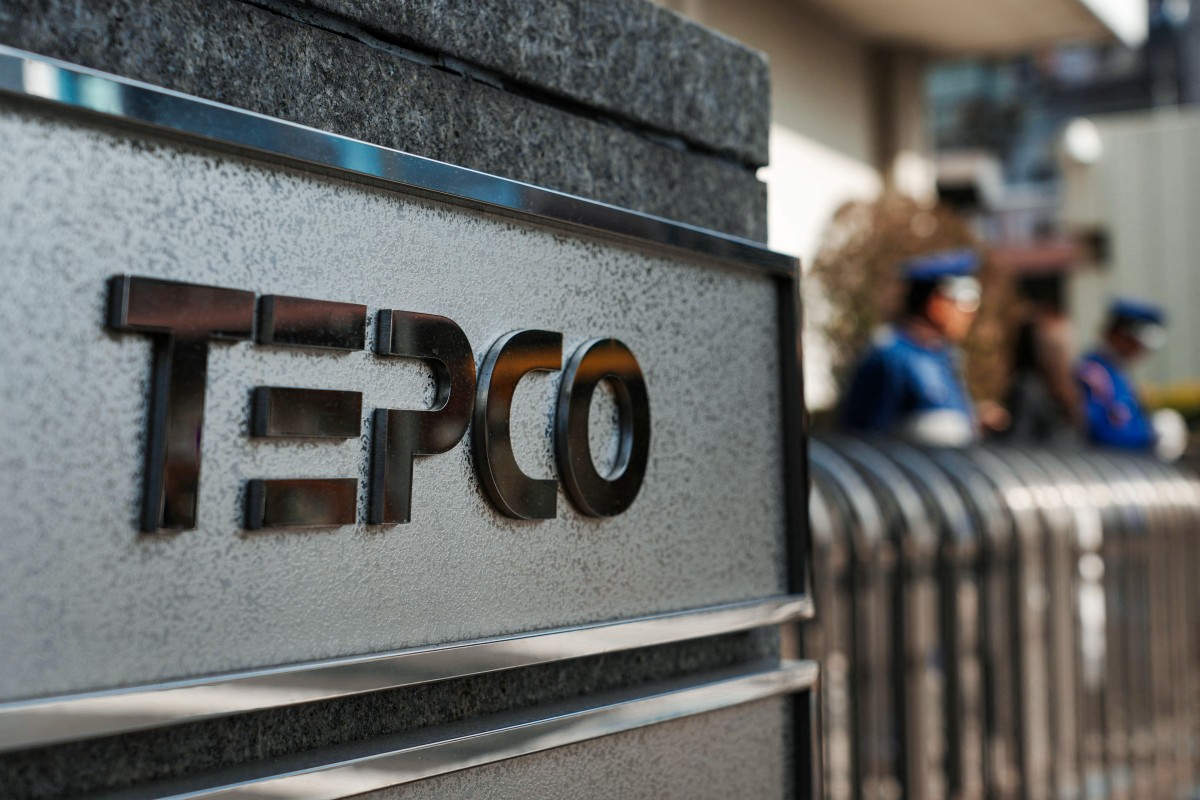
La centrale nucléaire japonaise de Kashiwazaki-Kariwa, la plus grande au monde, a repris ses activités mercredi pour la première fois depuis la catastrophe de Fukushima en 2011, malgré les inquiétudes persistantes d’une partie de la population.
La remise en service a eu lieu à 19h02 heure locale (10h02 GMT), a indiqué à l’AFP Tatsuya Matoba, porte-parole de la compagnie Tokyo Electric Power (Tepco).
Le gouverneur de la préfecture de Niigata, où se situe la centrale, avait donné son feu vert à la reprise le mois dernier, en dépit d’une opinion publique divisée. Selon une enquête menée en septembre par la préfecture elle-même, 60 % des habitants se déclaraient opposés au redémarrage, contre 37 % favorables.
Mardi, plusieurs dizaines de manifestants ont bravé le froid et la neige pour protester près de l’entrée du site, sur les rives de la mer du Japon.
« L’électricité de Tokyo est produite à Kashiwazaki. Pourquoi seuls les habitants d’ici devraient-ils être exposés au danger ? Cela n’a aucun sens », a déclaré à l’AFP Yumiko Abe, une riveraine de 73 ans.
La centrale de Kashiwazaki-Kariwa avait été mise à l’arrêt lorsque le Japon a fermé l’ensemble de ses réacteurs nucléaires à la suite du triple désastre de mars 2011 — un séisme, un tsunami et un accident nucléaire — survenu à Fukushima.
International
Markets rise as Trump halts Europe tariffs and floats Greenland agreement framework
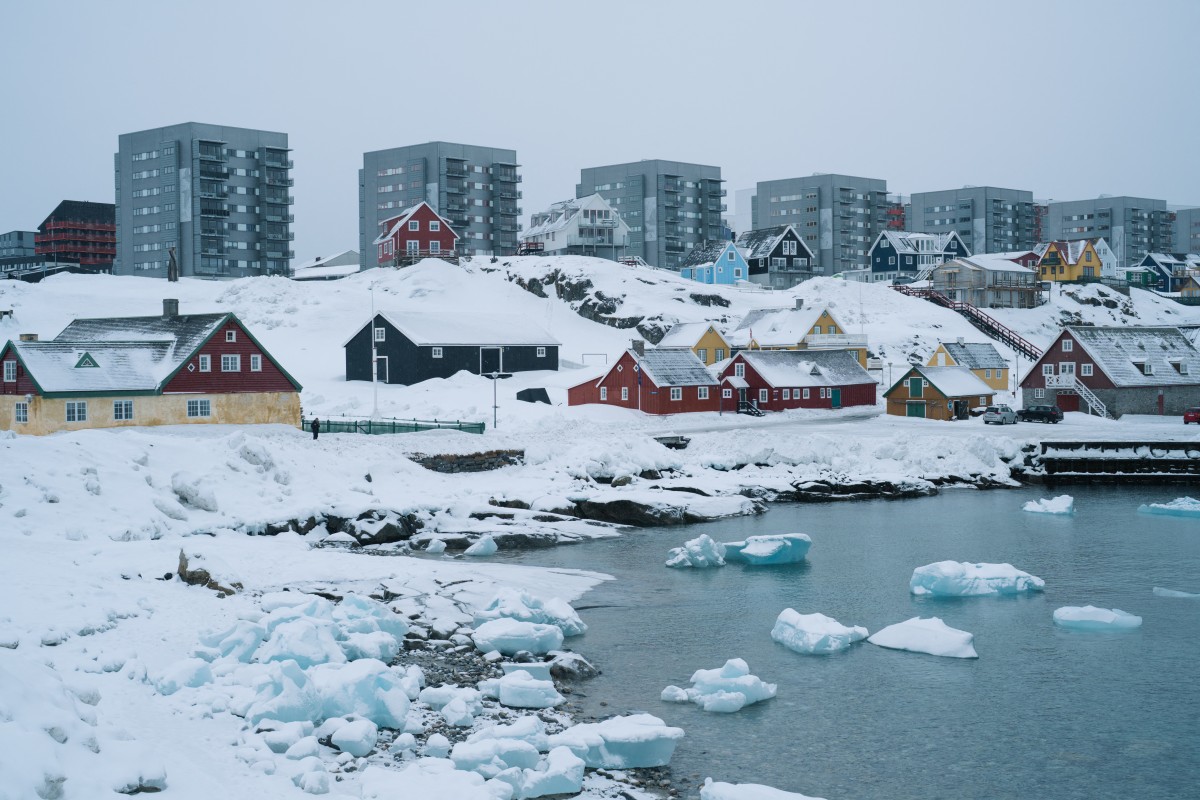
U.S. President Donald Trump on Wednesday lifted his threat to impose new tariffs on several European countries and said he had outlined the framework of a future agreement on Greenland during a meeting in Davos with NATO Secretary General Mark Rutte.
“Based on this understanding, I will not impose the tariffs that were scheduled to take effect on February 1,” Trump wrote on his social media platform Truth Social, without providing details about the proposed “framework.”
The announcement boosted financial markets. Wall Street, which had been trading slightly higher, extended its gains following Trump’s message, while the U.S. dollar strengthened against the euro.
Trump has repeatedly insisted that Greenland, rich in mineral resources, is ‘vital’ to the security of the United States and NATO, particularly as Arctic ice melts and global powers compete for strategic advantage in the region amid rising tensions with China and Russia.
Last week, the U.S. president threatened to impose tariffs of up to 25% on eight European countries for supporting Denmark and sending a military exploratory mission to Greenland. All of the targeted countries are NATO members, including the United Kingdom, Germany, and France, Europe’s largest economies.
Trump said on Wednesday that additional discussions are underway regarding the “Golden Dome” missile defense system, specifically in connection with Greenland.
He assigned Vice President JD Vance, Secretary of State Marco Rubio, and special envoy Steve Witkoff to lead the negotiations.
Hours before his post, Trump ruled out the use of force to seize Greenland for the first time, but demanded “immediate negotiations” for its acquisition, reiterating his view that only the United States can guarantee the security of the Arctic island.
International
Venezuela’s interim president predicts 37% increase in revenues for 2026
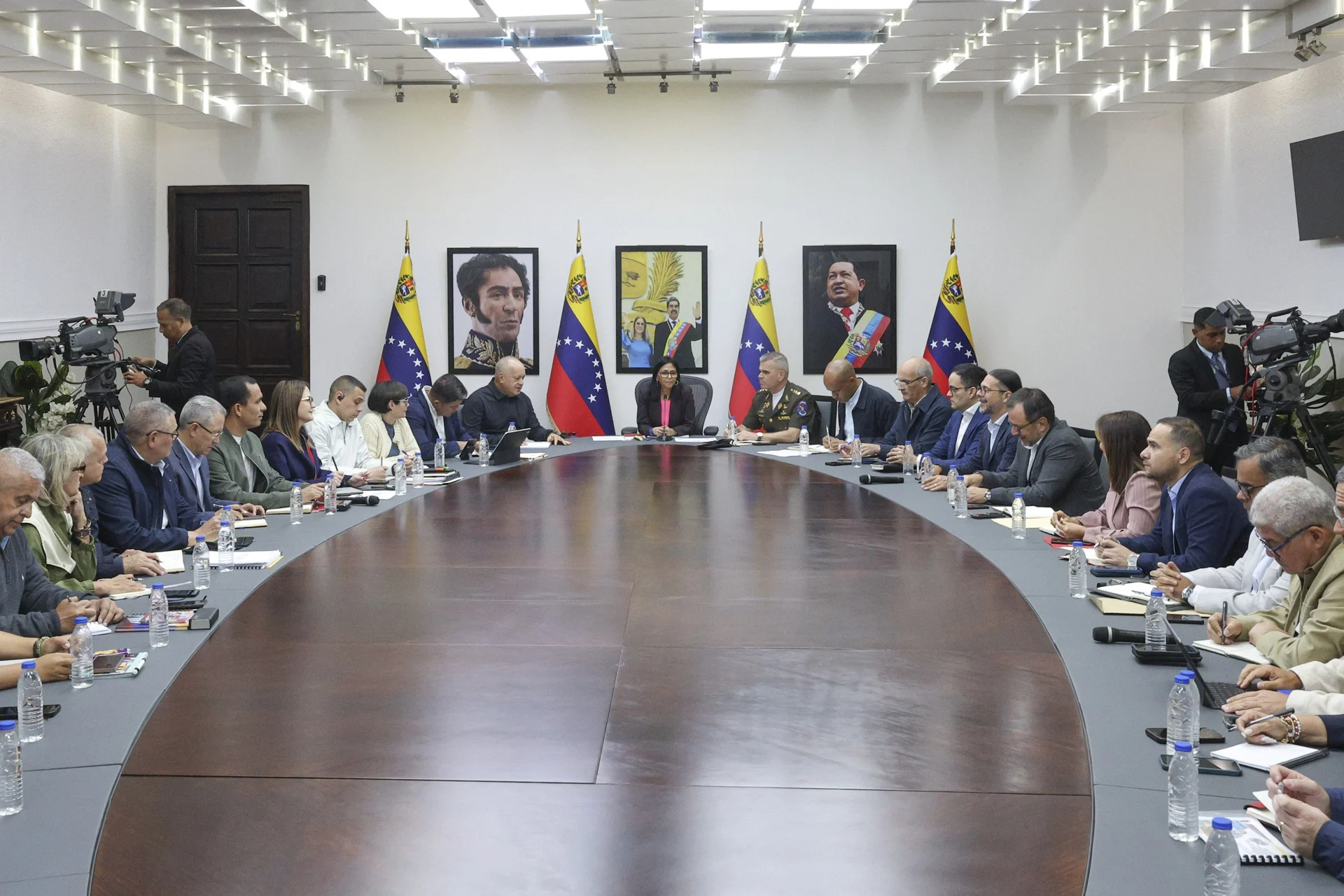
Venezuela’s interim president, Delcy Rodríguez, said Wednesday that the country’s revenues are expected to increase by about 37% in 2026, in a statement made during a session of the Federal Government Council at the Miraflores Presidential Palace in Caracas.
Rodríguez said the projected rise in foreign currency income comes as agreements on Venezuelan oil sales with the United States are being implemented, including deals in which Washington will trade Venezuelan crude and manage the proceeds before transferring funds to Caracas.
“This year, revenues expressed in foreign currency will increase by 37%,” Rodríguez declared, according to EFE. She noted that the increase will also benefit regional governments and local authorities. “You will have more resources for your management, which I know you need,” she added.
Rodríguez said the distribution formula for revenues will remain the same as in 2025: 53% for communes, 29% for state governments, 15% for municipalities, and 3% for institutional strengthening. She also said the government would intervene to “correct imbalances” in how funds are allocated, particularly among some municipal and regional authorities.
The announcement follows reporting that Venezuela received at least $300 million from oil revenues tied to a U.S.–Venezuela deal that could involve up to 50 million barrels of crude. Washington officials have said the interim government met U.S. requirements under the agreement.
-

 Central America3 days ago
Central America3 days agoGuatemala raises police death toll to nine after gang violence escalates
-

 Central America5 days ago
Central America5 days agoGuatemala prison uprisings leave 46 guards held by gangs
-

 International3 days ago
International3 days agoDeath toll from southern Spain train crash rises to 40
-

 International1 day ago
International1 day agoMexican influencer “La Nicholette” kidnapped in exclusive area of Culiacán
-

 International3 days ago
International3 days agoOver 160 christian worshippers kidnapped in Kaduna Church attacks
-

 International2 days ago
International2 days agoDaily Mail publisher insists reports relied on legitimate sources amid privacy trial
-

 International2 days ago
International2 days agoGermany says football bodies alone will decide on possible World Cup boycott
-

 International5 days ago
International5 days agoChile declares state of catastrophe as wildfires rage in Ñuble and Biobío
-

 International1 day ago
International1 day agoMajor winter storm to blanket U.S. and Canada with snow, ice and arctic cold
-

 International16 hours ago
International16 hours agoMarkets rise as Trump halts Europe tariffs and floats Greenland agreement framework
-

 International1 day ago
International1 day agoTrump announces preliminary NATO agreement on Greenland, suspends tariffs on Europe
-

 International3 days ago
International3 days agoSpain’s Prime Minister pledges transparency after train crash kills at least 39
-

 Central America16 hours ago
Central America16 hours agoMazatenango Carnival cancelled amid State of Siege in Guatemala
-
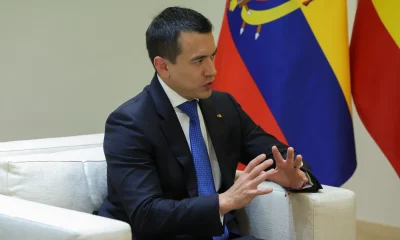
 International1 day ago
International1 day agoColombia slams Ecuador’s 30% tariff as ‘economic aggression’
-

 International16 hours ago
International16 hours agoVenezuela’s interim president predicts 37% increase in revenues for 2026
-

 International16 hours ago
International16 hours agoTrump to invite Venezuela’s interim president Delcy Rodríguez to Washington
-

 International16 hours ago
International16 hours agoJapan reopens Kashiwazaki-Kariwa Plant despite public concerns
-

 International16 hours ago
International16 hours agoFour minors killed in deadly clash between FARC dissidents in Colombia’s Amazon
-
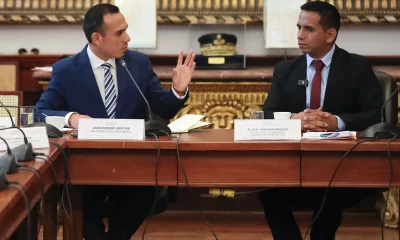
 International1 day ago
International1 day agoJosé Jerí claims destabilization attempt after videos of secretive meetings surface


























